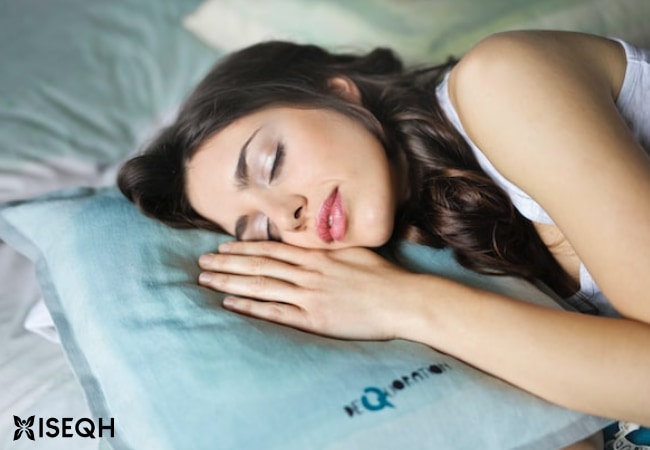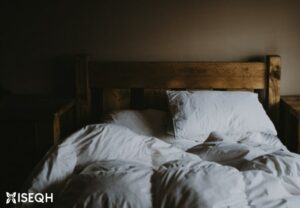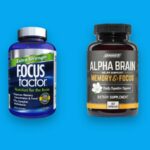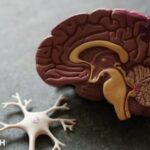
Table of Contents
Introduction
Sleep is essential for our health and well-being, but getting the right amount of sleep each night can be difficult. A good night’s sleep is important for mental and physical health, so it’s no wonder people are looking for better sleep. There are a lot of natural supplements that can help improve your sleep quality without putting your health at risk. Suppose you’re looking for a way to improve your sleep without taking medication. In that case, consider taking a nootropic supplement. But first, let’s understand sleeping better and how nootropics can play a role in that process.
Better sleep can be achieved using many strategies, including creating a more soothing bedroom environment and eliminating stress. You can also incorporate specific habits into your daily schedule to help you get a better night’s sleep. Try to incorporate these healthy habits into your routine and notice the difference!
How sleep works
According to the National Sleep Foundation, the average adult needs seven to nine hours of sleep per night to feel rested and refreshed the next day. Getting enough sleep can help you concentrate and perform your best during the day, but it can also do wonders for your physical and mental health. Unfortunately, most people do not get the recommended sleep each night.
According to a recent survey conducted by the National Sleep Foundation, more than 35% of Americans report getting less than seven hours of sleep per night regularly. But it’s not just the amount of sleep you get that matters – it’s also the quality of that sleep. Several factors, including anxiety, depression, medical conditions, and substance abuse, can cause poor sleep quality. However, poor sleep quality can also be caused by how you sleep.
You can do several things to improve the quality of your sleep, such as limiting your exposure to blue light before bed and creating a relaxing bedtime routine. In addition, taking a natural supplement like nootropics can also help you get a better night’s sleep. Read on to learn more about how nootropics work and how they can help you get a better night’s sleep.
Which Brain Functions Affect Sleep?
Brain functions play a key role in your ability to fall asleep and stay asleep throughout the night. Your brain controls virtually every process in your body, so it must function correctly.
According to the National Institutes of Health, a healthy brain function requires constant oxygen, nutrients, and energy to keep all systems running smoothly. When your brain doesn’t receive the proper amount of these things, it cannot function as it should. This can lead to symptoms of insomnia and other sleep disorders. The brain comprises several distinct regions, including the cerebral cortex, thalamus, basal ganglia, hypothalamus, and cerebellum.
Each of these regions plays a role in various processes related to sleep, such as regulating mood and behavior and controlling bodily functions during sleep. So the connection between your brain and sleep is clear: Sleep is essential for the proper functioning of your brain!
What are the Stages of Sleep?
It’s important to understand that we have four stages of sleep. These are the stages we experience when we are in the most profound state of rest and completely unaware of the world around us.
Stage One
Your body is preparing for sleep by slowing down your heart and breathing rates and beginning to relax your muscles. During this stage, you may be awakened easily but will quickly return to this stage of sleep when you fall back to sleep. You may also be unable to recall any of your dreams from this stage.
Stage Two
Humans spend up to half of their sleeping hours in slow-wave sleep. This stage occurs after you enter deep sleep at the beginning of the night and lasts about an hour and a half. During this time, your body releases growth hormones and other chemicals that help repair damaged tissues and increase your energy level the next day. Therefore, you must get enough slow-wave sleep each night to have a healthy metabolism and maintain a healthy weight.
Stage Three
In the early stages of REM sleep, you may move or make slight noises while dreaming. However, as your sleep progresses into deeper REM sleep stages, you will become more still and completely unaware of your surroundings. This is the final stage of sleep, and it is during this stage that most of your dreams occur.
Rapid Eye Movement (REM) Sleep
This is also called dream sleep or paradoxical sleep because it follows a period of non-rapid eye movement (NREM) sleep when the brain is completely inactive. During REM sleep, your muscle activity slows down almost to a standstill, making it impossible to act out your dreams physically. It is very difficult to tell if you are dreaming or not when you are in this state, so you will not remember your goals if you wake up during REM sleep. Scientists believe the reason for this phenomenon is that brain activity during REM sleep is similar to that experienced during the waking state, so as you transition to a deeper phase of sleep, the brain is forced to turn off the thoughts associated with wakefulness and begin dreaming about the day’s events instead. If our body doesn’t have enough time to go through the stages of sleep, there is a high chance that we will experience sleep deprivation.
What is Sleep Deprivation?
Sleep deprivation is the willful limitation of sleep to the detriment of one’s health or daily activities. Symptoms of sleep deprivation include fatigue, irritability, difficulty concentrating, poor memory and lack of motivation. Individuals who suffer from chronic sleep deprivation often develop serious health problems such as cardiovascular disease, obesity, diabetes, depression and other mental disorders. Lack of sufficient sleep can also cause accidents to occur in the workplace or other daily activities. While many believe that a short night of poor sleep will not be detrimental to their health, our bodies need quality sleep to perform at our best.
Best Nootropics For Sleep
L-Theanine
L-Theanine is an amino acid found in green tea. It increases brain serotonin and dopamine levels, which can improve your mood and help you relax and sleep better. It also boosts the levels of GABA in the brain, which helps slow down the rate at which neurons fire in the brain to reduce anxiety and stress. Studies have demonstrated that L-Theanine may help improve sleep quality and reduce anxiety in those with insomnia. It also helps to reduce restlessness and increases the production of alpha waves in the brain, a mental state similar to the wakeful but relaxed state of meditation.
Ashwagandha
Ashwagandha reduces cortisol levels in the body, which are chemicals released by your body under stress that can cause impaired cognitive functioning and memory loss. It also increases brain serotonin levels to promote feelings of calmness and relaxation and improves sleep quality. Studies have shown that ashwagandha can reduce stress and anxiety and enhance sleep quality in people with insomnia.
Rhodiola Rosea
Like the above two nootropics, Rhodiola rosea also helps to reduce stress and anxiety while improving sleep quality. It stimulates the release of dopamine and norepinephrine, enhancing concentration and promoting well-being and serenity. It also lowers cortisol levels in the body to help you relax and improve your sleep quality. Rhodiola rosea has also been shown to improve cognitive performance and memory in older adults.
Bacopa Monnieri
Recent studies have found that bacopa monnieri can improve memory and cognitive functioning in older adults. It is also believed to help relieve stress and anxiety and enhance sleep quality. In addition, studies show that bacopa monnieri promotes deep, restful sleep and helps maintain normal blood pressure levels during sleep. It can also stimulate the release of the neurotransmitter acetylcholine, which plays a role in maintaining cognitive health and improving memory.
Melatonin
Melatonin is a hormone produced by the brain that regulates sleep. It is often used in supplement form to treat insomnia and other sleep disorders. Research has shown that melatonin can enhance sleep quality by promoting drowsiness and reducing the time to fall asleep. It may also reduce anxiety and promote feelings of relaxation and well-being. However, people should consult their doctor before taking melatonin as it may interfere with certain medications such as blood thinners and anti-depressants. The recommended dose is between 0.5 and 5 mg, taken shortly before bedtime.
Magnesium
Magnesium is one of the essential minerals that our bodies need to maintain good health. It plays several important roles in the body, including promoting muscle relaxation and regulating calcium and potassium levels in the blood. A magnesium deficiency may lead to depression, fatigue, headaches and restless leg syndrome. It also helps reduce stress and improve the quality of sleep.
Phenibut
Phenibut is an adaptogen that adapts to your body’s needs to give you the best results possible by altering your response to stress or anxiety. It works by boosting the levels of GABA, a neurotransmitter in the brain that helps to calm and relax the mind and body. Phenibut can also promote a sense of calm and relaxation without making you feel drowsy or dizzy. It can be used to boost concentration and focus and reduce the effects of anxiety, stress and panic attacks. One common side effect is hangover-like symptoms after use, which can be reduced by supplementing with food.
L-Tryptophan
Tryptophan is an essential amino acid that cannot be produced by the body and must be obtained from the diet. It acts as a precursor for serotonin, a chemical compound that affects mood, appetite and sleep. The immune system also uses it to produce cytokines, chemicals that help regulate the immune response and prevent infection. Studies have found that supplementing with tryptophan can improve sleep quality by reducing anxiety and aiding in relaxation. It also helps to regulate the digestive system and has a positive effect on mood and immunity.
Valerian Root
Valerian Root has been popular for centuries as a mild sedative, natural remedy and popular ingredient in most leading sleeping products today. It contains an ingredient called valerenic acid, which works as an anxiolytic. It helps to decrease anxiety and stress levels by lowering levels of the stress hormone cortisol and increasing the mood-enhancing chemical serotonin.
Lemon Balm
Lemon balm contains a naturally occurring compound called eugenol which acts as an anxiolytic and relieves stress and anxiety while at the same time increasing energy levels and improving cognitive function. It also has antibacterial properties and is commonly used to treat urinary tract infections. In addition, a recent study has found that lemon balm effectively treats mild to moderate depression by increasing serotonin levels in the brain.
KEY TAKEAWAY
These supplements work best when they are taken together as they can complement each other and help alleviate various mental and physical health problems. Combined, these supplements can help prevent anxiety and depression and promote restful sleep and relaxation.
Consume as directed to ensure the best results. For best results, use continuously for maximum results. No severe side effects have been reported, but these supplements should not be used during pregnancy or lactation and should only be consumed as directed.








